New Homes Grant: Application, Eligibility & Lodgement Guide 2017
VerifiedAdded on 2023/06/14
|23
|10845
|177
Practical Assignment
AI Summary
This document provides a comprehensive guide to the First Home Owner Grant (New Homes) Scheme, outlining the steps for claiming the grant, applicant obligations, potential penalties, and detailed lodgement instructions. It specifies eligibility criteria for applicants and their spouses/partners, including restrictions on prior home ownership and previous grant receipt. The guide details required supporting evidence for identity verification and provides specific document requirements based on whether the application is lodged through an approved agent or directly with the Office of State Revenue (OSR). Additional evidence requirements are outlined for situations involving name changes, marriage, divorce, widowhood, or separation. Furthermore, it includes information on transaction types and the evidence needed for purchasing new homes or 'off the plan' properties, including contract copies. The document also clarifies payment timelines, residency requirements, common errors, and provides a glossary of terms. This guide is essential for anyone looking to understand and apply for the First Home Owner Grant (New Homes) scheme, and similar resources are available on Desklib.

First Home Owner Grant
(New Homes) Scheme
Application Form and Lodgement
Guide for New Homes
June 2017
(New Homes) Scheme
Application Form and Lodgement
Guide for New Homes
June 2017
Paraphrase This Document
Need a fresh take? Get an instant paraphrase of this document with our AI Paraphraser
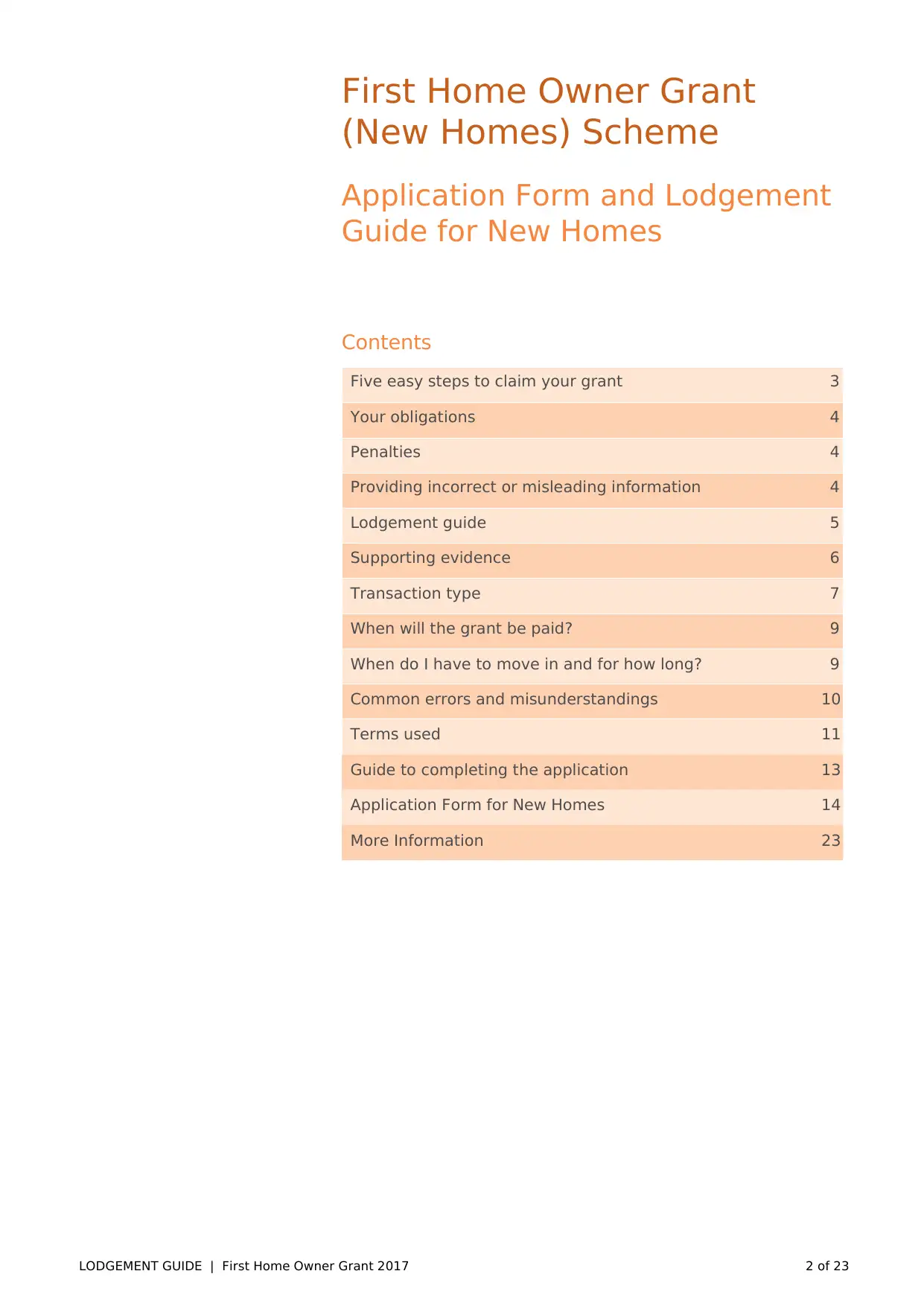
LODGEMENT GUIDE | First Home Owner Grant 2017 2 of 23
First Home Owner Grant
(New Homes) Scheme
Application Form and Lodgement
Guide for New Homes
Contents
Five easy steps to claim your grant 3
Your obligations 4
Penalties 4
Providing incorrect or misleading information 4
Lodgement guide 5
Supporting evidence 6
Transaction type 7
When will the grant be paid? 9
When do I have to move in and for how long? 9
Common errors and misunderstandings 10
Terms used 11
Guide to completing the application 13
Application Form for New Homes 14
More Information 23
First Home Owner Grant
(New Homes) Scheme
Application Form and Lodgement
Guide for New Homes
Contents
Five easy steps to claim your grant 3
Your obligations 4
Penalties 4
Providing incorrect or misleading information 4
Lodgement guide 5
Supporting evidence 6
Transaction type 7
When will the grant be paid? 9
When do I have to move in and for how long? 9
Common errors and misunderstandings 10
Terms used 11
Guide to completing the application 13
Application Form for New Homes 14
More Information 23
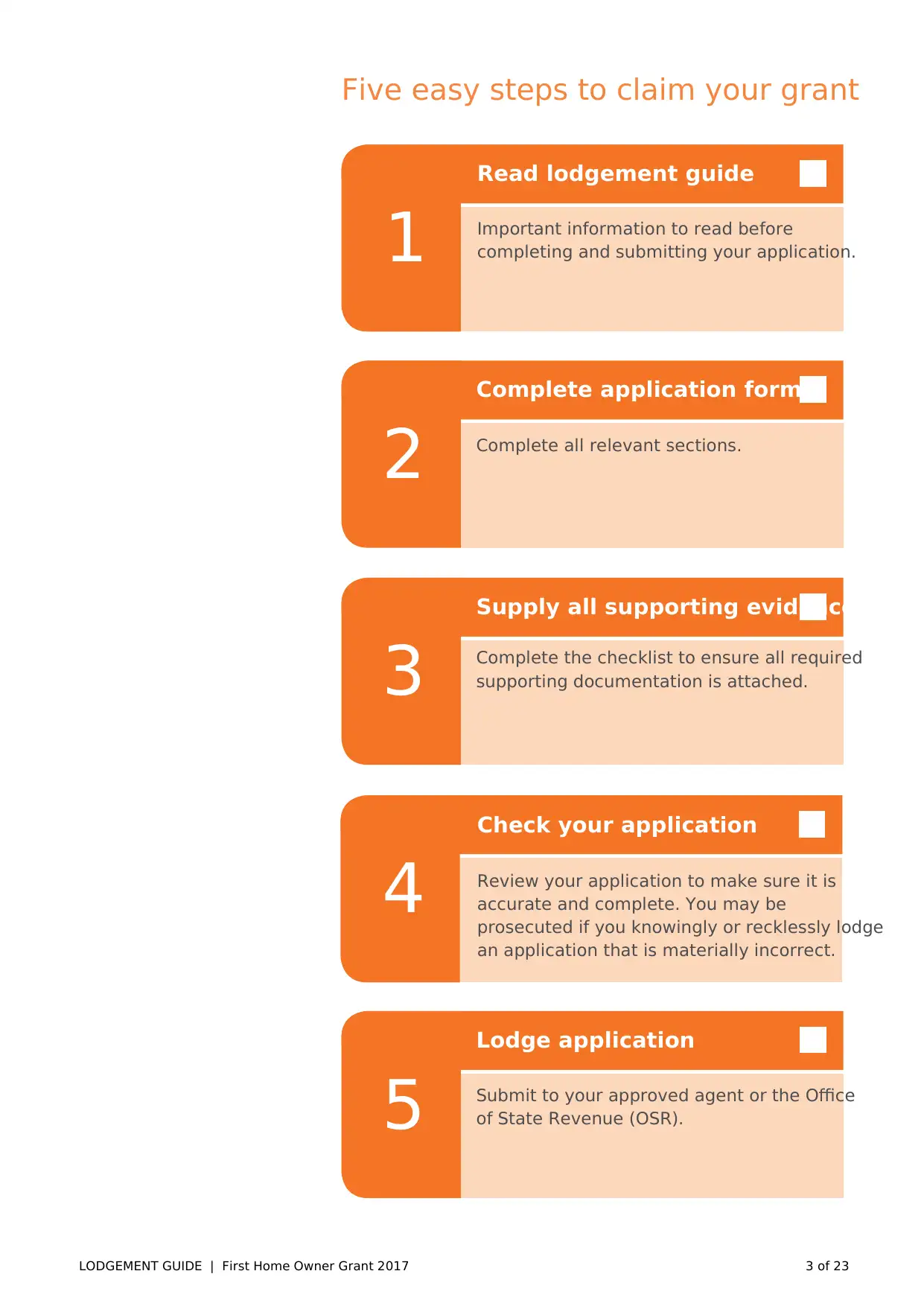
LODGEMENT GUIDE | First Home Owner Grant 2017 3 of 23
Five easy steps to claim your grant
2
4
5
3
Complete application form
Complete all relevant sections.
Lodge application
Submit to your approved agent or the Office
of State Revenue (OSR).
Supply all supporting evidence
Complete the checklist to ensure all required
supporting documentation is attached.
Check your application
Review your application to make sure it is
accurate and complete. You may be
prosecuted if you knowingly or recklessly lodge
an application that is materially incorrect.
1
Read lodgement guide
Important information to read before
completing and submitting your application.
Five easy steps to claim your grant
2
4
5
3
Complete application form
Complete all relevant sections.
Lodge application
Submit to your approved agent or the Office
of State Revenue (OSR).
Supply all supporting evidence
Complete the checklist to ensure all required
supporting documentation is attached.
Check your application
Review your application to make sure it is
accurate and complete. You may be
prosecuted if you knowingly or recklessly lodge
an application that is materially incorrect.
1
Read lodgement guide
Important information to read before
completing and submitting your application.
⊘ This is a preview!⊘
Do you want full access?
Subscribe today to unlock all pages.

Trusted by 1+ million students worldwide
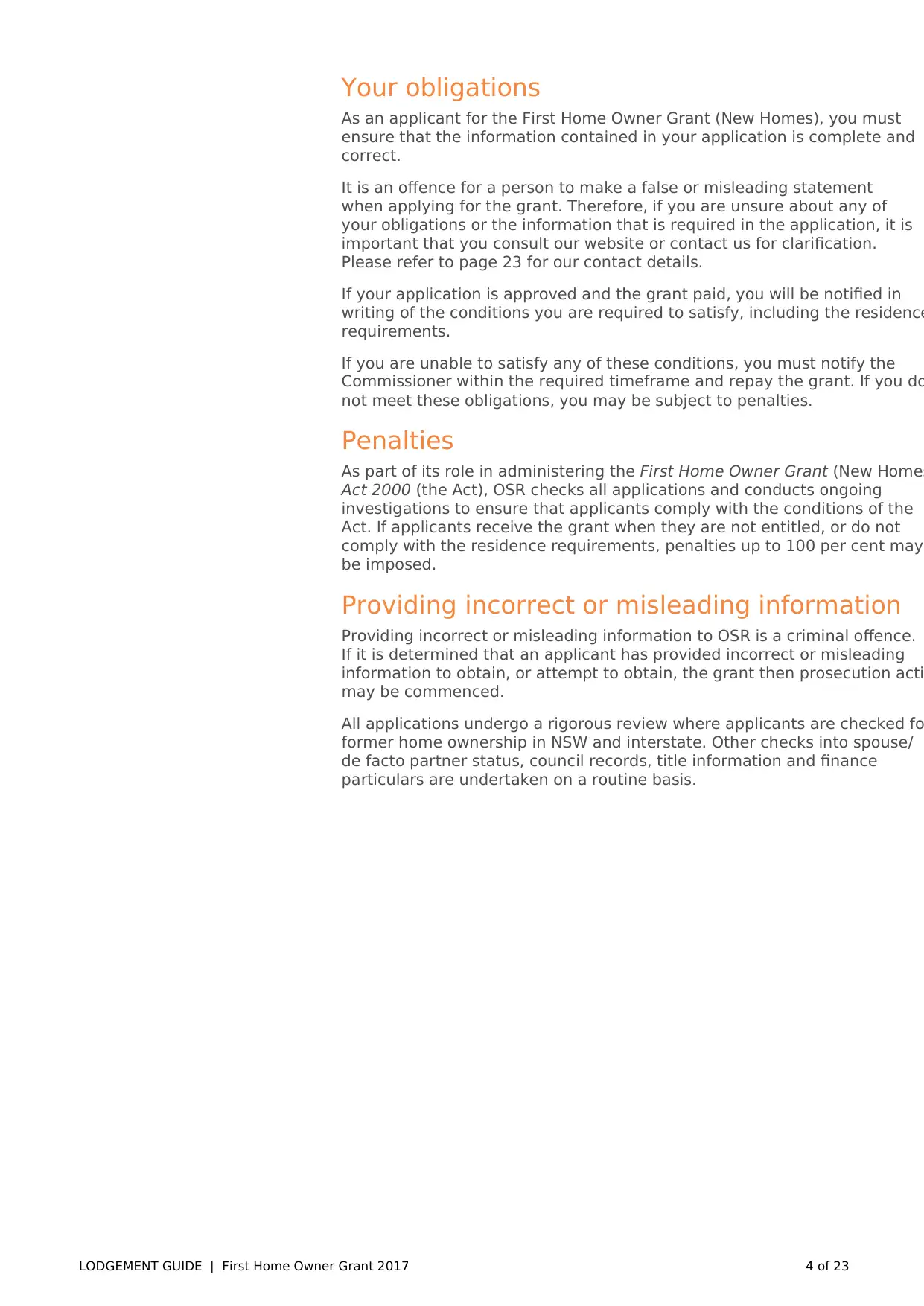
LODGEMENT GUIDE | First Home Owner Grant 2017 4 of 23
Your obligations
As an applicant for the First Home Owner Grant (New Homes), you must
ensure that the information contained in your application is complete and
correct.
It is an offence for a person to make a false or misleading statement
when applying for the grant. Therefore, if you are unsure about any of
your obligations or the information that is required in the application, it is
important that you consult our website or contact us for clarification.
Please refer to page 23 for our contact details.
If your application is approved and the grant paid, you will be notified in
writing of the conditions you are required to satisfy, including the residence
requirements.
If you are unable to satisfy any of these conditions, you must notify the
Commissioner within the required timeframe and repay the grant. If you do
not meet these obligations, you may be subject to penalties.
Penalties
As part of its role in administering the First Home Owner Grant (New Homes
Act 2000 (the Act), OSR checks all applications and conducts ongoing
investigations to ensure that applicants comply with the conditions of the
Act. If applicants receive the grant when they are not entitled, or do not
comply with the residence requirements, penalties up to 100 per cent may
be imposed.
Providing incorrect or misleading information
Providing incorrect or misleading information to OSR is a criminal offence.
If it is determined that an applicant has provided incorrect or misleading
information to obtain, or attempt to obtain, the grant then prosecution acti
may be commenced.
All applications undergo a rigorous review where applicants are checked fo
former home ownership in NSW and interstate. Other checks into spouse/
de facto partner status, council records, title information and finance
particulars are undertaken on a routine basis.
Your obligations
As an applicant for the First Home Owner Grant (New Homes), you must
ensure that the information contained in your application is complete and
correct.
It is an offence for a person to make a false or misleading statement
when applying for the grant. Therefore, if you are unsure about any of
your obligations or the information that is required in the application, it is
important that you consult our website or contact us for clarification.
Please refer to page 23 for our contact details.
If your application is approved and the grant paid, you will be notified in
writing of the conditions you are required to satisfy, including the residence
requirements.
If you are unable to satisfy any of these conditions, you must notify the
Commissioner within the required timeframe and repay the grant. If you do
not meet these obligations, you may be subject to penalties.
Penalties
As part of its role in administering the First Home Owner Grant (New Homes
Act 2000 (the Act), OSR checks all applications and conducts ongoing
investigations to ensure that applicants comply with the conditions of the
Act. If applicants receive the grant when they are not entitled, or do not
comply with the residence requirements, penalties up to 100 per cent may
be imposed.
Providing incorrect or misleading information
Providing incorrect or misleading information to OSR is a criminal offence.
If it is determined that an applicant has provided incorrect or misleading
information to obtain, or attempt to obtain, the grant then prosecution acti
may be commenced.
All applications undergo a rigorous review where applicants are checked fo
former home ownership in NSW and interstate. Other checks into spouse/
de facto partner status, council records, title information and finance
particulars are undertaken on a routine basis.
Paraphrase This Document
Need a fresh take? Get an instant paraphrase of this document with our AI Paraphraser
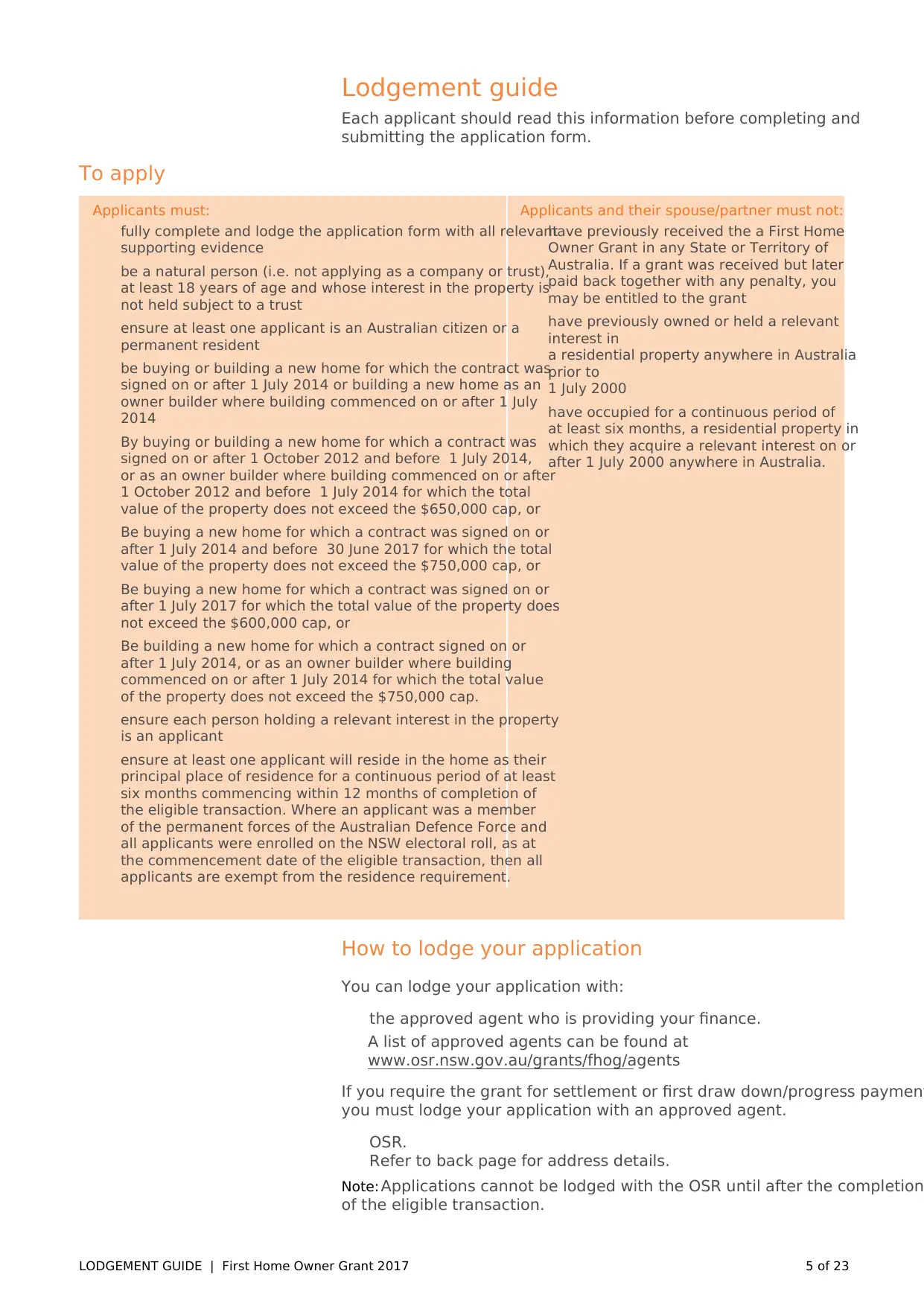
LODGEMENT GUIDE | First Home Owner Grant 2017 5 of 23
Applicants must:
fully complete and lodge the application form with all relevant
supporting evidence
be a natural person (i.e. not applying as a company or trust),
at least 18 years of age and whose interest in the property is
not held subject to a trust
ensure at least one applicant is an Australian citizen or a
permanent resident
be buying or building a new home for which the contract was
signed on or after 1 July 2014 or building a new home as an
owner builder where building commenced on or after 1 July
2014
By buying or building a new home for which a contract was
signed on or after 1 October 2012 and before 1 July 2014,
or as an owner builder where building commenced on or after
1 October 2012 and before 1 July 2014 for which the total
value of the property does not exceed the $650,000 cap, or
Be buying a new home for which a contract was signed on or
after 1 July 2014 and before 30 June 2017 for which the total
value of the property does not exceed the $750,000 cap, or
Be buying a new home for which a contract was signed on or
after 1 July 2017 for which the total value of the property does
not exceed the $600,000 cap, or
Be building a new home for which a contract signed on or
after 1 July 2014, or as an owner builder where building
commenced on or after 1 July 2014 for which the total value
of the property does not exceed the $750,000 cap.
ensure each person holding a relevant interest in the property
is an applicant
ensure at least one applicant will reside in the home as their
principal place of residence for a continuous period of at least
six months commencing within 12 months of completion of
the eligible transaction. Where an applicant was a member
of the permanent forces of the Australian Defence Force and
all applicants were enrolled on the NSW electoral roll, as at
the commencement date of the eligible transaction, then all
applicants are exempt from the residence requirement.
Applicants and their spouse/partner must not:
have previously received the a First Home
Owner Grant in any State or Territory of
Australia. If a grant was received but later
paid back together with any penalty, you
may be entitled to the grant
have previously owned or held a relevant
interest in
a residential property anywhere in Australia
prior to
1 July 2000
have occupied for a continuous period of
at least six months, a residential property in
which they acquire a relevant interest on or
after 1 July 2000 anywhere in Australia.
Lodgement guide
Each applicant should read this information before completing and
submitting the application form.
How to lodge your application
You can lodge your application with:
the approved agent who is providing your finance.
A list of approved agents can be found at
www.osr.nsw.gov.au/grants/fhog/agents
If you require the grant for settlement or first draw down/progress payment
you must lodge your application with an approved agent.
OSR.
Refer to back page for address details.
Note: Applications cannot be lodged with the OSR until after the completion
of the eligible transaction.
To apply
Applicants must:
fully complete and lodge the application form with all relevant
supporting evidence
be a natural person (i.e. not applying as a company or trust),
at least 18 years of age and whose interest in the property is
not held subject to a trust
ensure at least one applicant is an Australian citizen or a
permanent resident
be buying or building a new home for which the contract was
signed on or after 1 July 2014 or building a new home as an
owner builder where building commenced on or after 1 July
2014
By buying or building a new home for which a contract was
signed on or after 1 October 2012 and before 1 July 2014,
or as an owner builder where building commenced on or after
1 October 2012 and before 1 July 2014 for which the total
value of the property does not exceed the $650,000 cap, or
Be buying a new home for which a contract was signed on or
after 1 July 2014 and before 30 June 2017 for which the total
value of the property does not exceed the $750,000 cap, or
Be buying a new home for which a contract was signed on or
after 1 July 2017 for which the total value of the property does
not exceed the $600,000 cap, or
Be building a new home for which a contract signed on or
after 1 July 2014, or as an owner builder where building
commenced on or after 1 July 2014 for which the total value
of the property does not exceed the $750,000 cap.
ensure each person holding a relevant interest in the property
is an applicant
ensure at least one applicant will reside in the home as their
principal place of residence for a continuous period of at least
six months commencing within 12 months of completion of
the eligible transaction. Where an applicant was a member
of the permanent forces of the Australian Defence Force and
all applicants were enrolled on the NSW electoral roll, as at
the commencement date of the eligible transaction, then all
applicants are exempt from the residence requirement.
Applicants and their spouse/partner must not:
have previously received the a First Home
Owner Grant in any State or Territory of
Australia. If a grant was received but later
paid back together with any penalty, you
may be entitled to the grant
have previously owned or held a relevant
interest in
a residential property anywhere in Australia
prior to
1 July 2000
have occupied for a continuous period of
at least six months, a residential property in
which they acquire a relevant interest on or
after 1 July 2000 anywhere in Australia.
Lodgement guide
Each applicant should read this information before completing and
submitting the application form.
How to lodge your application
You can lodge your application with:
the approved agent who is providing your finance.
A list of approved agents can be found at
www.osr.nsw.gov.au/grants/fhog/agents
If you require the grant for settlement or first draw down/progress payment
you must lodge your application with an approved agent.
OSR.
Refer to back page for address details.
Note: Applications cannot be lodged with the OSR until after the completion
of the eligible transaction.
To apply
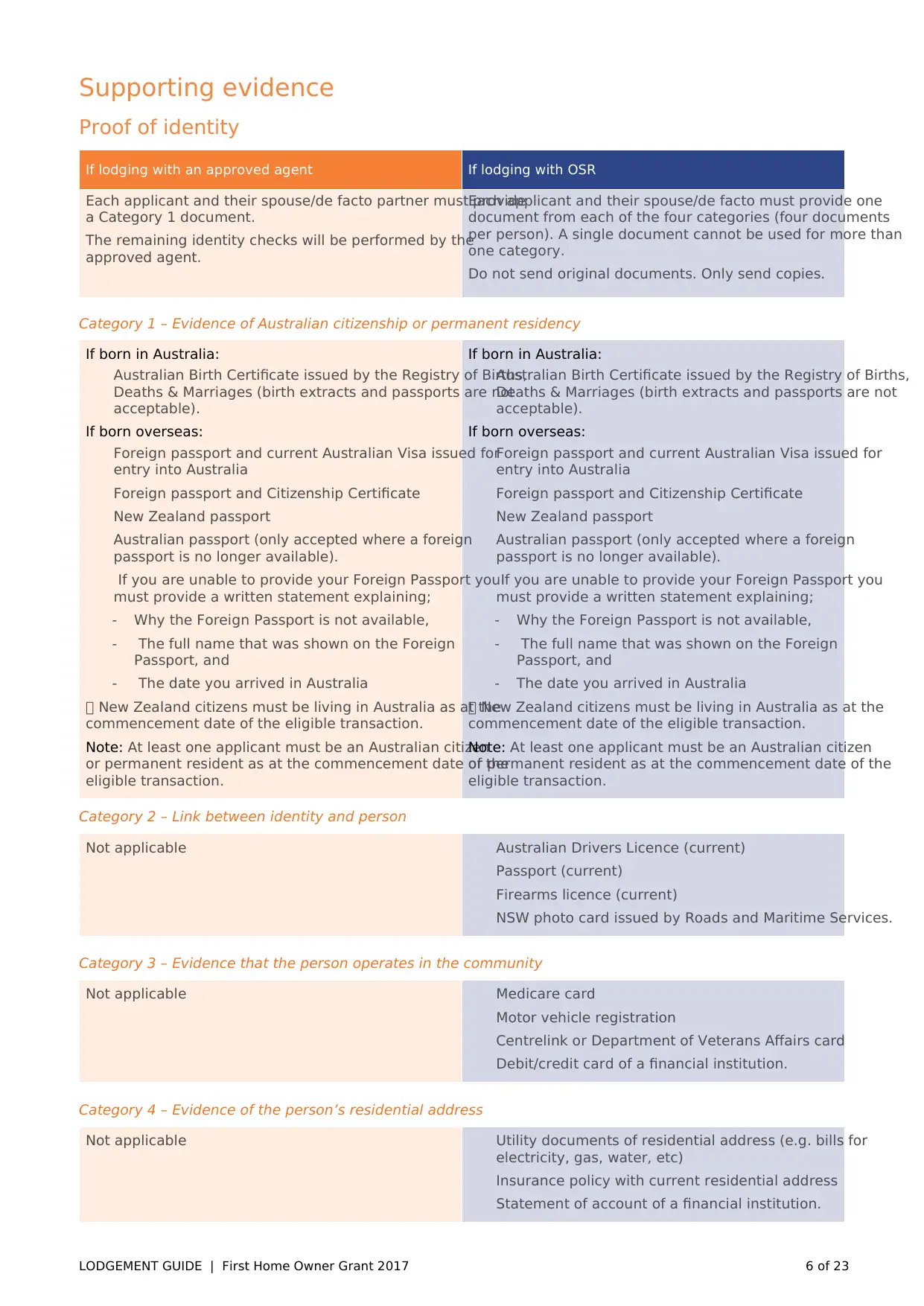
LODGEMENT GUIDE | First Home Owner Grant 2017 6 of 23
If lodging with an approved agent If lodging with OSR
Not applicable Australian Drivers Licence (current)
Passport (current)
Firearms licence (current)
NSW photo card issued by Roads and Maritime Services.
Supporting evidence
Proof of identity
If lodging with an approved agent If lodging with OSR
Each applicant and their spouse/de facto partner must provide
a Category 1 document.
The remaining identity checks will be performed by the
approved agent.
Each applicant and their spouse/de facto must provide one
document from each of the four categories (four documents
per person). A single document cannot be used for more than
one category.
Do not send original documents. Only send copies.
If lodging with an approved agent If lodging with OSR
If born in Australia:
Australian Birth Certificate issued by the Registry of Births,
Deaths & Marriages (birth extracts and passports are not
acceptable).
If born overseas:
Foreign passport and current Australian Visa issued for
entry into Australia
Foreign passport and Citizenship Certificate
New Zealand passport
Australian passport (only accepted where a foreign
passport is no longer available).
If you are unable to provide your Foreign Passport you
must provide a written statement explaining;
- Why the Foreign Passport is not available,
- The full name that was shown on the Foreign
Passport, and
- The date you arrived in Australia
New Zealand citizens must be living in Australia as at the
commencement date of the eligible transaction.
Note: At least one applicant must be an Australian citizen
or permanent resident as at the commencement date of the
eligible transaction.
If born in Australia:
Australian Birth Certificate issued by the Registry of Births,
Deaths & Marriages (birth extracts and passports are not
acceptable).
If born overseas:
Foreign passport and current Australian Visa issued for
entry into Australia
Foreign passport and Citizenship Certificate
New Zealand passport
Australian passport (only accepted where a foreign
passport is no longer available).
If you are unable to provide your Foreign Passport you
must provide a written statement explaining;
- Why the Foreign Passport is not available,
- The full name that was shown on the Foreign
Passport, and
- The date you arrived in Australia
New Zealand citizens must be living in Australia as at the
commencement date of the eligible transaction.
Note: At least one applicant must be an Australian citizen
or permanent resident as at the commencement date of the
eligible transaction.
Category 2 – Link between identity and person
If lodging with an approved agent If lodging with OSR
Not applicable Medicare card
Motor vehicle registration
Centrelink or Department of Veterans Affairs card
Debit/credit card of a financial institution.
Category 3 – Evidence that the person operates in the community
If lodging with an approved agent If lodging with OSR
Not applicable Utility documents of residential address (e.g. bills for
electricity, gas, water, etc)
Insurance policy with current residential address
Statement of account of a financial institution.
Category 4 – Evidence of the person’s residential address
Category 1 – Evidence of Australian citizenship or permanent residency
If lodging with an approved agent If lodging with OSR
Not applicable Australian Drivers Licence (current)
Passport (current)
Firearms licence (current)
NSW photo card issued by Roads and Maritime Services.
Supporting evidence
Proof of identity
If lodging with an approved agent If lodging with OSR
Each applicant and their spouse/de facto partner must provide
a Category 1 document.
The remaining identity checks will be performed by the
approved agent.
Each applicant and their spouse/de facto must provide one
document from each of the four categories (four documents
per person). A single document cannot be used for more than
one category.
Do not send original documents. Only send copies.
If lodging with an approved agent If lodging with OSR
If born in Australia:
Australian Birth Certificate issued by the Registry of Births,
Deaths & Marriages (birth extracts and passports are not
acceptable).
If born overseas:
Foreign passport and current Australian Visa issued for
entry into Australia
Foreign passport and Citizenship Certificate
New Zealand passport
Australian passport (only accepted where a foreign
passport is no longer available).
If you are unable to provide your Foreign Passport you
must provide a written statement explaining;
- Why the Foreign Passport is not available,
- The full name that was shown on the Foreign
Passport, and
- The date you arrived in Australia
New Zealand citizens must be living in Australia as at the
commencement date of the eligible transaction.
Note: At least one applicant must be an Australian citizen
or permanent resident as at the commencement date of the
eligible transaction.
If born in Australia:
Australian Birth Certificate issued by the Registry of Births,
Deaths & Marriages (birth extracts and passports are not
acceptable).
If born overseas:
Foreign passport and current Australian Visa issued for
entry into Australia
Foreign passport and Citizenship Certificate
New Zealand passport
Australian passport (only accepted where a foreign
passport is no longer available).
If you are unable to provide your Foreign Passport you
must provide a written statement explaining;
- Why the Foreign Passport is not available,
- The full name that was shown on the Foreign
Passport, and
- The date you arrived in Australia
New Zealand citizens must be living in Australia as at the
commencement date of the eligible transaction.
Note: At least one applicant must be an Australian citizen
or permanent resident as at the commencement date of the
eligible transaction.
Category 2 – Link between identity and person
If lodging with an approved agent If lodging with OSR
Not applicable Medicare card
Motor vehicle registration
Centrelink or Department of Veterans Affairs card
Debit/credit card of a financial institution.
Category 3 – Evidence that the person operates in the community
If lodging with an approved agent If lodging with OSR
Not applicable Utility documents of residential address (e.g. bills for
electricity, gas, water, etc)
Insurance policy with current residential address
Statement of account of a financial institution.
Category 4 – Evidence of the person’s residential address
Category 1 – Evidence of Australian citizenship or permanent residency
⊘ This is a preview!⊘
Do you want full access?
Subscribe today to unlock all pages.

Trusted by 1+ million students worldwide
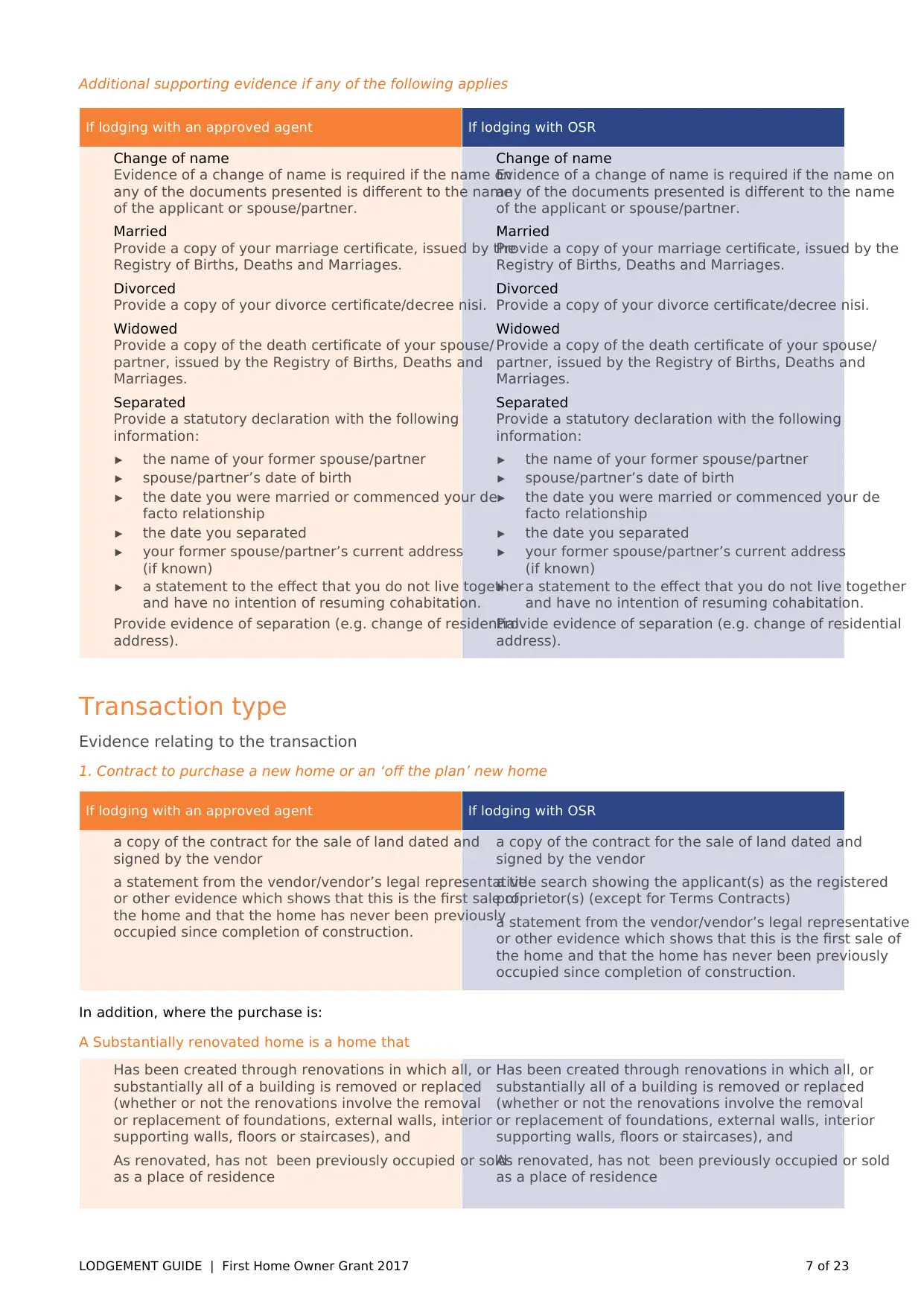
LODGEMENT GUIDE | First Home Owner Grant 2017 7 of 23
Transaction type
Evidence relating to the transaction
If lodging with an approved agent If lodging with OSR
a copy of the contract for the sale of land dated and
signed by the vendor
a statement from the vendor/vendor’s legal representative
or other evidence which shows that this is the first sale of
the home and that the home has never been previously
occupied since completion of construction.
a copy of the contract for the sale of land dated and
signed by the vendor
a title search showing the applicant(s) as the registered
proprietor(s) (except for Terms Contracts)
a statement from the vendor/vendor’s legal representative
or other evidence which shows that this is the first sale of
the home and that the home has never been previously
occupied since completion of construction.
If lodging with an approved agent If lodging with OSR
Has been created through renovations in which all, or
substantially all of a building is removed or replaced
(whether or not the renovations involve the removal
or replacement of foundations, external walls, interior
supporting walls, floors or staircases), and
As renovated, has not been previously occupied or sold
as a place of residence
Has been created through renovations in which all, or
substantially all of a building is removed or replaced
(whether or not the renovations involve the removal
or replacement of foundations, external walls, interior
supporting walls, floors or staircases), and
As renovated, has not been previously occupied or sold
as a place of residence
1. Contract to purchase a new home or an ‘off the plan’ new home
In addition, where the purchase is:
A Substantially renovated home is a home that
If lodging with an approved agent If lodging with OSR
Change of name
Evidence of a change of name is required if the name on
any of the documents presented is different to the name
of the applicant or spouse/partner.
Married
Provide a copy of your marriage certificate, issued by the
Registry of Births, Deaths and Marriages.
Divorced
Provide a copy of your divorce certificate/decree nisi.
Widowed
Provide a copy of the death certificate of your spouse/
partner, issued by the Registry of Births, Deaths and
Marriages.
Separated
Provide a statutory declaration with the following
information:
► the name of your former spouse/partner
► spouse/partner’s date of birth
► the date you were married or commenced your de
facto relationship
► the date you separated
► your former spouse/partner’s current address
(if known)
► a statement to the effect that you do not live together
and have no intention of resuming cohabitation.
Provide evidence of separation (e.g. change of residential
address).
Change of name
Evidence of a change of name is required if the name on
any of the documents presented is different to the name
of the applicant or spouse/partner.
Married
Provide a copy of your marriage certificate, issued by the
Registry of Births, Deaths and Marriages.
Divorced
Provide a copy of your divorce certificate/decree nisi.
Widowed
Provide a copy of the death certificate of your spouse/
partner, issued by the Registry of Births, Deaths and
Marriages.
Separated
Provide a statutory declaration with the following
information:
► the name of your former spouse/partner
► spouse/partner’s date of birth
► the date you were married or commenced your de
facto relationship
► the date you separated
► your former spouse/partner’s current address
(if known)
► a statement to the effect that you do not live together
and have no intention of resuming cohabitation.
Provide evidence of separation (e.g. change of residential
address).
Additional supporting evidence if any of the following applies
Transaction type
Evidence relating to the transaction
If lodging with an approved agent If lodging with OSR
a copy of the contract for the sale of land dated and
signed by the vendor
a statement from the vendor/vendor’s legal representative
or other evidence which shows that this is the first sale of
the home and that the home has never been previously
occupied since completion of construction.
a copy of the contract for the sale of land dated and
signed by the vendor
a title search showing the applicant(s) as the registered
proprietor(s) (except for Terms Contracts)
a statement from the vendor/vendor’s legal representative
or other evidence which shows that this is the first sale of
the home and that the home has never been previously
occupied since completion of construction.
If lodging with an approved agent If lodging with OSR
Has been created through renovations in which all, or
substantially all of a building is removed or replaced
(whether or not the renovations involve the removal
or replacement of foundations, external walls, interior
supporting walls, floors or staircases), and
As renovated, has not been previously occupied or sold
as a place of residence
Has been created through renovations in which all, or
substantially all of a building is removed or replaced
(whether or not the renovations involve the removal
or replacement of foundations, external walls, interior
supporting walls, floors or staircases), and
As renovated, has not been previously occupied or sold
as a place of residence
1. Contract to purchase a new home or an ‘off the plan’ new home
In addition, where the purchase is:
A Substantially renovated home is a home that
If lodging with an approved agent If lodging with OSR
Change of name
Evidence of a change of name is required if the name on
any of the documents presented is different to the name
of the applicant or spouse/partner.
Married
Provide a copy of your marriage certificate, issued by the
Registry of Births, Deaths and Marriages.
Divorced
Provide a copy of your divorce certificate/decree nisi.
Widowed
Provide a copy of the death certificate of your spouse/
partner, issued by the Registry of Births, Deaths and
Marriages.
Separated
Provide a statutory declaration with the following
information:
► the name of your former spouse/partner
► spouse/partner’s date of birth
► the date you were married or commenced your de
facto relationship
► the date you separated
► your former spouse/partner’s current address
(if known)
► a statement to the effect that you do not live together
and have no intention of resuming cohabitation.
Provide evidence of separation (e.g. change of residential
address).
Change of name
Evidence of a change of name is required if the name on
any of the documents presented is different to the name
of the applicant or spouse/partner.
Married
Provide a copy of your marriage certificate, issued by the
Registry of Births, Deaths and Marriages.
Divorced
Provide a copy of your divorce certificate/decree nisi.
Widowed
Provide a copy of the death certificate of your spouse/
partner, issued by the Registry of Births, Deaths and
Marriages.
Separated
Provide a statutory declaration with the following
information:
► the name of your former spouse/partner
► spouse/partner’s date of birth
► the date you were married or commenced your de
facto relationship
► the date you separated
► your former spouse/partner’s current address
(if known)
► a statement to the effect that you do not live together
and have no intention of resuming cohabitation.
Provide evidence of separation (e.g. change of residential
address).
Additional supporting evidence if any of the following applies
Paraphrase This Document
Need a fresh take? Get an instant paraphrase of this document with our AI Paraphraser
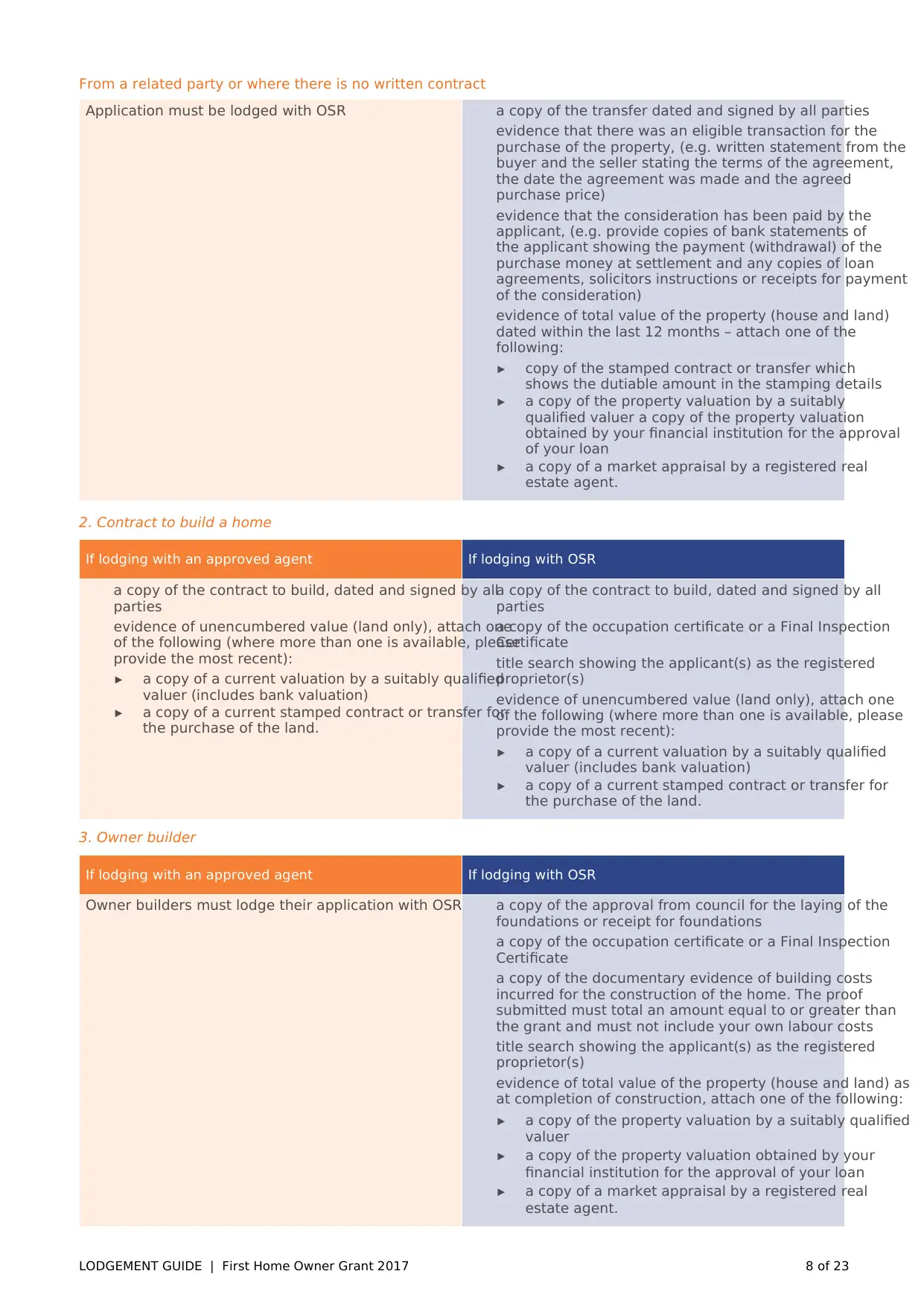
LODGEMENT GUIDE | First Home Owner Grant 2017 8 of 23
From a related party or where there is no written contract
2. Contract to build a home
If lodging with an approved agent If lodging with OSR
a copy of the contract to build, dated and signed by all
parties
evidence of unencumbered value (land only), attach one
of the following (where more than one is available, please
provide the most recent):
► a copy of a current valuation by a suitably qualified
valuer (includes bank valuation)
► a copy of a current stamped contract or transfer for
the purchase of the land.
a copy of the contract to build, dated and signed by all
parties
a copy of the occupation certificate or a Final Inspection
Certificate
title search showing the applicant(s) as the registered
proprietor(s)
evidence of unencumbered value (land only), attach one
of the following (where more than one is available, please
provide the most recent):
► a copy of a current valuation by a suitably qualified
valuer (includes bank valuation)
► a copy of a current stamped contract or transfer for
the purchase of the land.
Application must be lodged with OSR a copy of the transfer dated and signed by all parties
evidence that there was an eligible transaction for the
purchase of the property, (e.g. written statement from the
buyer and the seller stating the terms of the agreement,
the date the agreement was made and the agreed
purchase price)
evidence that the consideration has been paid by the
applicant, (e.g. provide copies of bank statements of
the applicant showing the payment (withdrawal) of the
purchase money at settlement and any copies of loan
agreements, solicitors instructions or receipts for payment
of the consideration)
evidence of total value of the property (house and land)
dated within the last 12 months – attach one of the
following:
► copy of the stamped contract or transfer which
shows the dutiable amount in the stamping details
► a copy of the property valuation by a suitably
qualified valuer a copy of the property valuation
obtained by your financial institution for the approval
of your loan
► a copy of a market appraisal by a registered real
estate agent.
3. Owner builder
If lodging with an approved agent If lodging with OSR
Owner builders must lodge their application with OSR a copy of the approval from council for the laying of the
foundations or receipt for foundations
a copy of the occupation certificate or a Final Inspection
Certificate
a copy of the documentary evidence of building costs
incurred for the construction of the home. The proof
submitted must total an amount equal to or greater than
the grant and must not include your own labour costs
title search showing the applicant(s) as the registered
proprietor(s)
evidence of total value of the property (house and land) as
at completion of construction, attach one of the following:
► a copy of the property valuation by a suitably qualified
valuer
► a copy of the property valuation obtained by your
financial institution for the approval of your loan
► a copy of a market appraisal by a registered real
estate agent.
From a related party or where there is no written contract
2. Contract to build a home
If lodging with an approved agent If lodging with OSR
a copy of the contract to build, dated and signed by all
parties
evidence of unencumbered value (land only), attach one
of the following (where more than one is available, please
provide the most recent):
► a copy of a current valuation by a suitably qualified
valuer (includes bank valuation)
► a copy of a current stamped contract or transfer for
the purchase of the land.
a copy of the contract to build, dated and signed by all
parties
a copy of the occupation certificate or a Final Inspection
Certificate
title search showing the applicant(s) as the registered
proprietor(s)
evidence of unencumbered value (land only), attach one
of the following (where more than one is available, please
provide the most recent):
► a copy of a current valuation by a suitably qualified
valuer (includes bank valuation)
► a copy of a current stamped contract or transfer for
the purchase of the land.
Application must be lodged with OSR a copy of the transfer dated and signed by all parties
evidence that there was an eligible transaction for the
purchase of the property, (e.g. written statement from the
buyer and the seller stating the terms of the agreement,
the date the agreement was made and the agreed
purchase price)
evidence that the consideration has been paid by the
applicant, (e.g. provide copies of bank statements of
the applicant showing the payment (withdrawal) of the
purchase money at settlement and any copies of loan
agreements, solicitors instructions or receipts for payment
of the consideration)
evidence of total value of the property (house and land)
dated within the last 12 months – attach one of the
following:
► copy of the stamped contract or transfer which
shows the dutiable amount in the stamping details
► a copy of the property valuation by a suitably
qualified valuer a copy of the property valuation
obtained by your financial institution for the approval
of your loan
► a copy of a market appraisal by a registered real
estate agent.
3. Owner builder
If lodging with an approved agent If lodging with OSR
Owner builders must lodge their application with OSR a copy of the approval from council for the laying of the
foundations or receipt for foundations
a copy of the occupation certificate or a Final Inspection
Certificate
a copy of the documentary evidence of building costs
incurred for the construction of the home. The proof
submitted must total an amount equal to or greater than
the grant and must not include your own labour costs
title search showing the applicant(s) as the registered
proprietor(s)
evidence of total value of the property (house and land) as
at completion of construction, attach one of the following:
► a copy of the property valuation by a suitably qualified
valuer
► a copy of the property valuation obtained by your
financial institution for the approval of your loan
► a copy of a market appraisal by a registered real
estate agent.
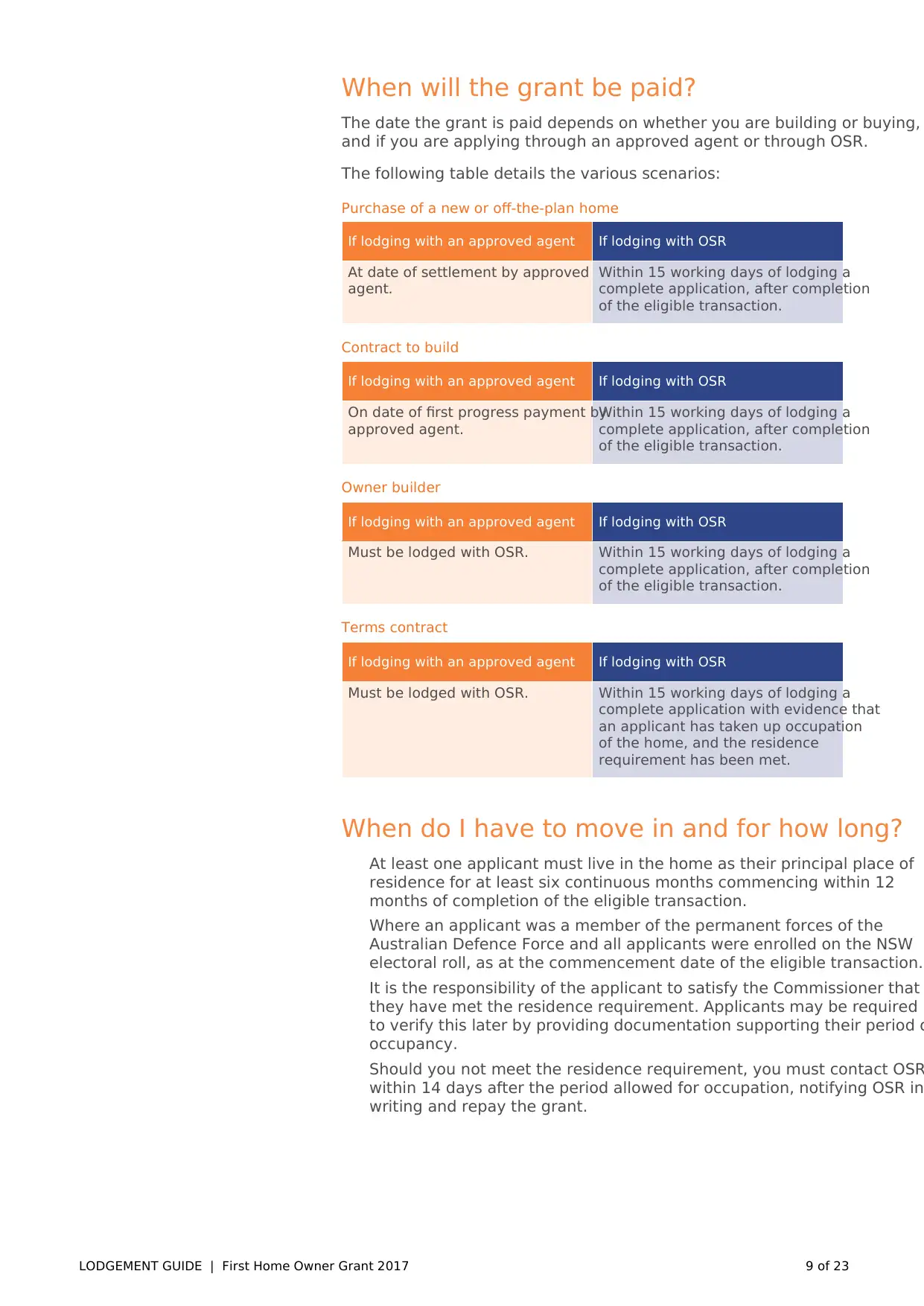
LODGEMENT GUIDE | First Home Owner Grant 2017 9 of 23
When will the grant be paid?
The date the grant is paid depends on whether you are building or buying,
and if you are applying through an approved agent or through OSR.
The following table details the various scenarios:
Purchase of a new or off-the-plan home
If lodging with an approved agent If lodging with OSR
At date of settlement by approved
agent.
Within 15 working days of lodging a
complete application, after completion
of the eligible transaction.
Contract to build
If lodging with an approved agent If lodging with OSR
On date of first progress payment by
approved agent.
Within 15 working days of lodging a
complete application, after completion
of the eligible transaction.
Owner builder
If lodging with an approved agent If lodging with OSR
Must be lodged with OSR. Within 15 working days of lodging a
complete application, after completion
of the eligible transaction.
Terms contract
If lodging with an approved agent If lodging with OSR
Must be lodged with OSR. Within 15 working days of lodging a
complete application with evidence that
an applicant has taken up occupation
of the home, and the residence
requirement has been met.
When do I have to move in and for how long?
At least one applicant must live in the home as their principal place of
residence for at least six continuous months commencing within 12
months of completion of the eligible transaction.
Where an applicant was a member of the permanent forces of the
Australian Defence Force and all applicants were enrolled on the NSW
electoral roll, as at the commencement date of the eligible transaction.
It is the responsibility of the applicant to satisfy the Commissioner that
they have met the residence requirement. Applicants may be required
to verify this later by providing documentation supporting their period o
occupancy.
Should you not meet the residence requirement, you must contact OSR
within 14 days after the period allowed for occupation, notifying OSR in
writing and repay the grant.
When will the grant be paid?
The date the grant is paid depends on whether you are building or buying,
and if you are applying through an approved agent or through OSR.
The following table details the various scenarios:
Purchase of a new or off-the-plan home
If lodging with an approved agent If lodging with OSR
At date of settlement by approved
agent.
Within 15 working days of lodging a
complete application, after completion
of the eligible transaction.
Contract to build
If lodging with an approved agent If lodging with OSR
On date of first progress payment by
approved agent.
Within 15 working days of lodging a
complete application, after completion
of the eligible transaction.
Owner builder
If lodging with an approved agent If lodging with OSR
Must be lodged with OSR. Within 15 working days of lodging a
complete application, after completion
of the eligible transaction.
Terms contract
If lodging with an approved agent If lodging with OSR
Must be lodged with OSR. Within 15 working days of lodging a
complete application with evidence that
an applicant has taken up occupation
of the home, and the residence
requirement has been met.
When do I have to move in and for how long?
At least one applicant must live in the home as their principal place of
residence for at least six continuous months commencing within 12
months of completion of the eligible transaction.
Where an applicant was a member of the permanent forces of the
Australian Defence Force and all applicants were enrolled on the NSW
electoral roll, as at the commencement date of the eligible transaction.
It is the responsibility of the applicant to satisfy the Commissioner that
they have met the residence requirement. Applicants may be required
to verify this later by providing documentation supporting their period o
occupancy.
Should you not meet the residence requirement, you must contact OSR
within 14 days after the period allowed for occupation, notifying OSR in
writing and repay the grant.
⊘ This is a preview!⊘
Do you want full access?
Subscribe today to unlock all pages.

Trusted by 1+ million students worldwide
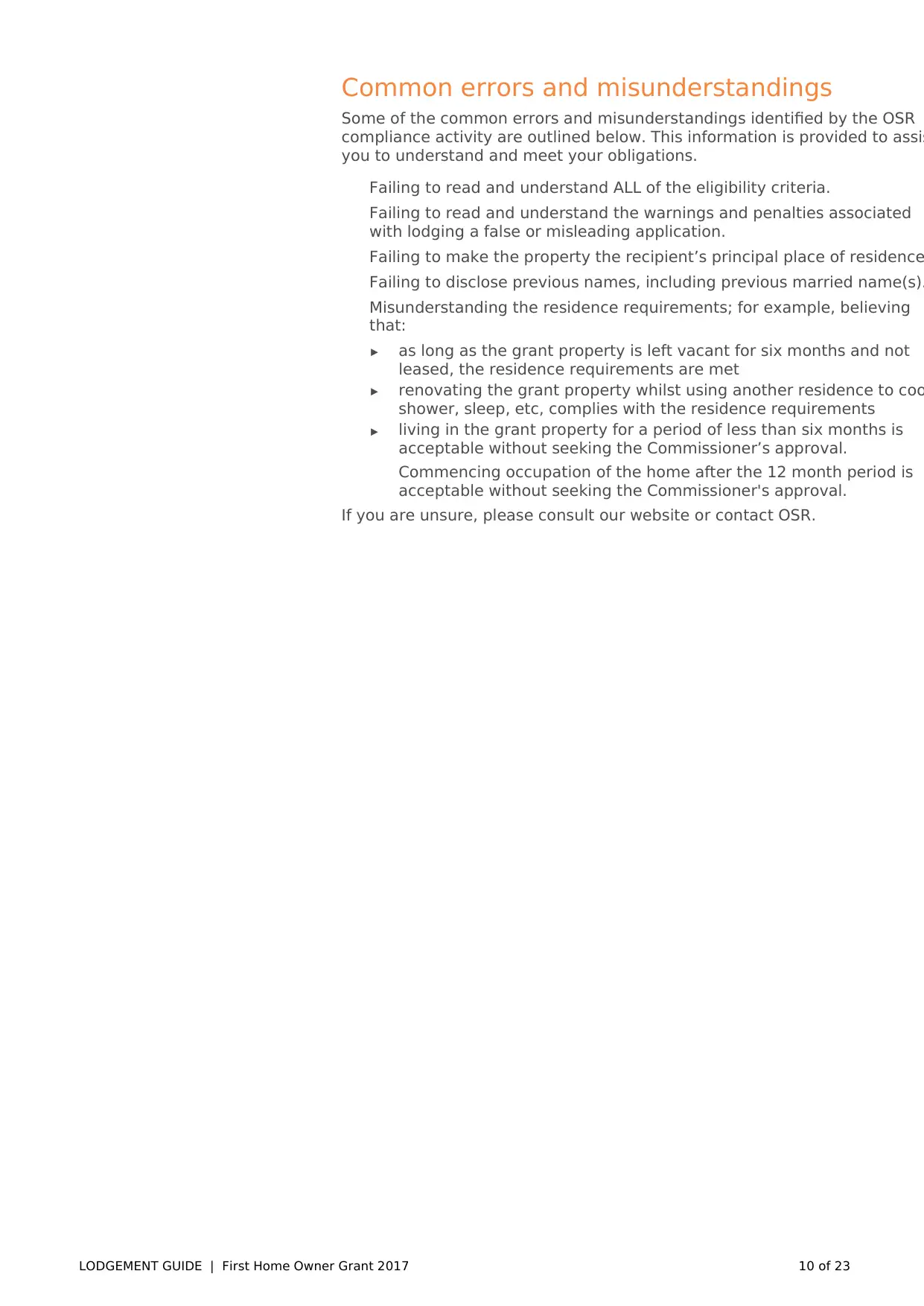
LODGEMENT GUIDE | First Home Owner Grant 2017 10 of 23
Common errors and misunderstandings
Some of the common errors and misunderstandings identified by the OSR
compliance activity are outlined below. This information is provided to assis
you to understand and meet your obligations.
Failing to read and understand ALL of the eligibility criteria.
Failing to read and understand the warnings and penalties associated
with lodging a false or misleading application.
Failing to make the property the recipient’s principal place of residence
Failing to disclose previous names, including previous married name(s).
Misunderstanding the residence requirements; for example, believing
that:
► as long as the grant property is left vacant for six months and not
leased, the residence requirements are met
► renovating the grant property whilst using another residence to coo
shower, sleep, etc, complies with the residence requirements
► living in the grant property for a period of less than six months is
acceptable without seeking the Commissioner’s approval.
Commencing occupation of the home after the 12 month period is
acceptable without seeking the Commissioner's approval.
If you are unsure, please consult our website or contact OSR.
Common errors and misunderstandings
Some of the common errors and misunderstandings identified by the OSR
compliance activity are outlined below. This information is provided to assis
you to understand and meet your obligations.
Failing to read and understand ALL of the eligibility criteria.
Failing to read and understand the warnings and penalties associated
with lodging a false or misleading application.
Failing to make the property the recipient’s principal place of residence
Failing to disclose previous names, including previous married name(s).
Misunderstanding the residence requirements; for example, believing
that:
► as long as the grant property is left vacant for six months and not
leased, the residence requirements are met
► renovating the grant property whilst using another residence to coo
shower, sleep, etc, complies with the residence requirements
► living in the grant property for a period of less than six months is
acceptable without seeking the Commissioner’s approval.
Commencing occupation of the home after the 12 month period is
acceptable without seeking the Commissioner's approval.
If you are unsure, please consult our website or contact OSR.
Paraphrase This Document
Need a fresh take? Get an instant paraphrase of this document with our AI Paraphraser
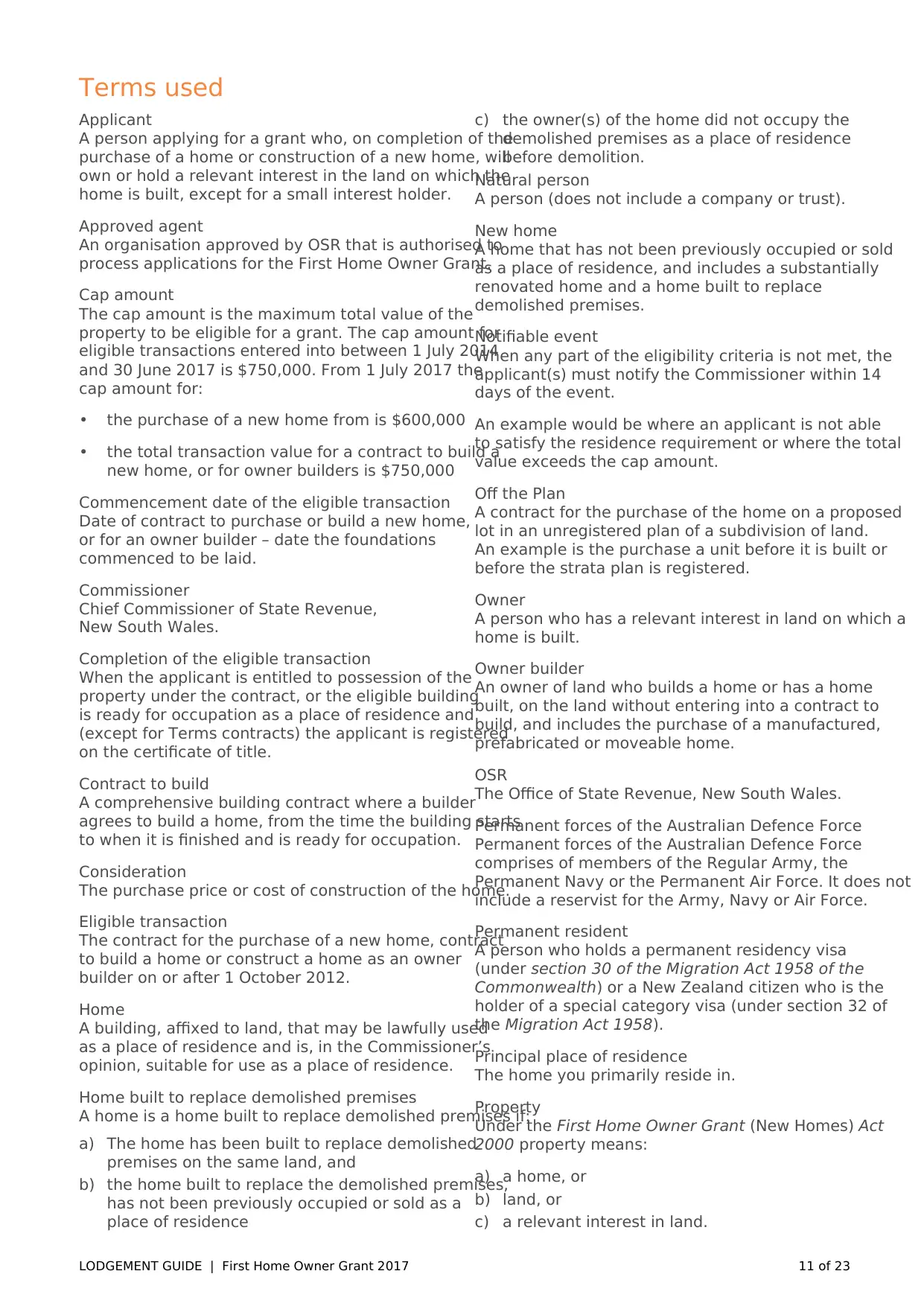
LODGEMENT GUIDE | First Home Owner Grant 2017 11 of 23
Terms used
Applicant
A person applying for a grant who, on completion of the
purchase of a home or construction of a new home, will
own or hold a relevant interest in the land on which the
home is built, except for a small interest holder.
Approved agent
An organisation approved by OSR that is authorised to
process applications for the First Home Owner Grant.
Cap amount
The cap amount is the maximum total value of the
property to be eligible for a grant. The cap amount for
eligible transactions entered into between 1 July 2014
and 30 June 2017 is $750,000. From 1 July 2017 the
cap amount for:
• the purchase of a new home from is $600,000
• the total transaction value for a contract to build a
new home, or for owner builders is $750,000
Commencement date of the eligible transaction
Date of contract to purchase or build a new home,
or for an owner builder – date the foundations
commenced to be laid.
Commissioner
Chief Commissioner of State Revenue,
New South Wales.
Completion of the eligible transaction
When the applicant is entitled to possession of the
property under the contract, or the eligible building
is ready for occupation as a place of residence and
(except for Terms contracts) the applicant is registered
on the certificate of title.
Contract to build
A comprehensive building contract where a builder
agrees to build a home, from the time the building starts
to when it is finished and is ready for occupation.
Consideration
The purchase price or cost of construction of the home.
Eligible transaction
The contract for the purchase of a new home, contract
to build a home or construct a home as an owner
builder on or after 1 October 2012.
Home
A building, affixed to land, that may be lawfully used
as a place of residence and is, in the Commissioner’s
opinion, suitable for use as a place of residence.
Home built to replace demolished premises
A home is a home built to replace demolished premises if:
a) The home has been built to replace demolished
premises on the same land, and
b) the home built to replace the demolished premises,
has not been previously occupied or sold as a
place of residence
c) the owner(s) of the home did not occupy the
demolished premises as a place of residence
before demolition.
Natural person
A person (does not include a company or trust).
New home
A home that has not been previously occupied or sold
as a place of residence, and includes a substantially
renovated home and a home built to replace
demolished premises.
Notifiable event
When any part of the eligibility criteria is not met, the
applicant(s) must notify the Commissioner within 14
days of the event.
An example would be where an applicant is not able
to satisfy the residence requirement or where the total
value exceeds the cap amount.
Off the Plan
A contract for the purchase of the home on a proposed
lot in an unregistered plan of a subdivision of land.
An example is the purchase a unit before it is built or
before the strata plan is registered.
Owner
A person who has a relevant interest in land on which a
home is built.
Owner builder
An owner of land who builds a home or has a home
built, on the land without entering into a contract to
build, and includes the purchase of a manufactured,
prefabricated or moveable home.
OSR
The Office of State Revenue, New South Wales.
Permanent forces of the Australian Defence Force
Permanent forces of the Australian Defence Force
comprises of members of the Regular Army, the
Permanent Navy or the Permanent Air Force. It does not
include a reservist for the Army, Navy or Air Force.
Permanent resident
A person who holds a permanent residency visa
(under section 30 of the Migration Act 1958 of the
Commonwealth) or a New Zealand citizen who is the
holder of a special category visa (under section 32 of
the Migration Act 1958).
Principal place of residence
The home you primarily reside in.
Property
Under the First Home Owner Grant (New Homes) Act
2000 property means:
a) a home, or
b) land, or
c) a relevant interest in land.
Terms used
Applicant
A person applying for a grant who, on completion of the
purchase of a home or construction of a new home, will
own or hold a relevant interest in the land on which the
home is built, except for a small interest holder.
Approved agent
An organisation approved by OSR that is authorised to
process applications for the First Home Owner Grant.
Cap amount
The cap amount is the maximum total value of the
property to be eligible for a grant. The cap amount for
eligible transactions entered into between 1 July 2014
and 30 June 2017 is $750,000. From 1 July 2017 the
cap amount for:
• the purchase of a new home from is $600,000
• the total transaction value for a contract to build a
new home, or for owner builders is $750,000
Commencement date of the eligible transaction
Date of contract to purchase or build a new home,
or for an owner builder – date the foundations
commenced to be laid.
Commissioner
Chief Commissioner of State Revenue,
New South Wales.
Completion of the eligible transaction
When the applicant is entitled to possession of the
property under the contract, or the eligible building
is ready for occupation as a place of residence and
(except for Terms contracts) the applicant is registered
on the certificate of title.
Contract to build
A comprehensive building contract where a builder
agrees to build a home, from the time the building starts
to when it is finished and is ready for occupation.
Consideration
The purchase price or cost of construction of the home.
Eligible transaction
The contract for the purchase of a new home, contract
to build a home or construct a home as an owner
builder on or after 1 October 2012.
Home
A building, affixed to land, that may be lawfully used
as a place of residence and is, in the Commissioner’s
opinion, suitable for use as a place of residence.
Home built to replace demolished premises
A home is a home built to replace demolished premises if:
a) The home has been built to replace demolished
premises on the same land, and
b) the home built to replace the demolished premises,
has not been previously occupied or sold as a
place of residence
c) the owner(s) of the home did not occupy the
demolished premises as a place of residence
before demolition.
Natural person
A person (does not include a company or trust).
New home
A home that has not been previously occupied or sold
as a place of residence, and includes a substantially
renovated home and a home built to replace
demolished premises.
Notifiable event
When any part of the eligibility criteria is not met, the
applicant(s) must notify the Commissioner within 14
days of the event.
An example would be where an applicant is not able
to satisfy the residence requirement or where the total
value exceeds the cap amount.
Off the Plan
A contract for the purchase of the home on a proposed
lot in an unregistered plan of a subdivision of land.
An example is the purchase a unit before it is built or
before the strata plan is registered.
Owner
A person who has a relevant interest in land on which a
home is built.
Owner builder
An owner of land who builds a home or has a home
built, on the land without entering into a contract to
build, and includes the purchase of a manufactured,
prefabricated or moveable home.
OSR
The Office of State Revenue, New South Wales.
Permanent forces of the Australian Defence Force
Permanent forces of the Australian Defence Force
comprises of members of the Regular Army, the
Permanent Navy or the Permanent Air Force. It does not
include a reservist for the Army, Navy or Air Force.
Permanent resident
A person who holds a permanent residency visa
(under section 30 of the Migration Act 1958 of the
Commonwealth) or a New Zealand citizen who is the
holder of a special category visa (under section 32 of
the Migration Act 1958).
Principal place of residence
The home you primarily reside in.
Property
Under the First Home Owner Grant (New Homes) Act
2000 property means:
a) a home, or
b) land, or
c) a relevant interest in land.
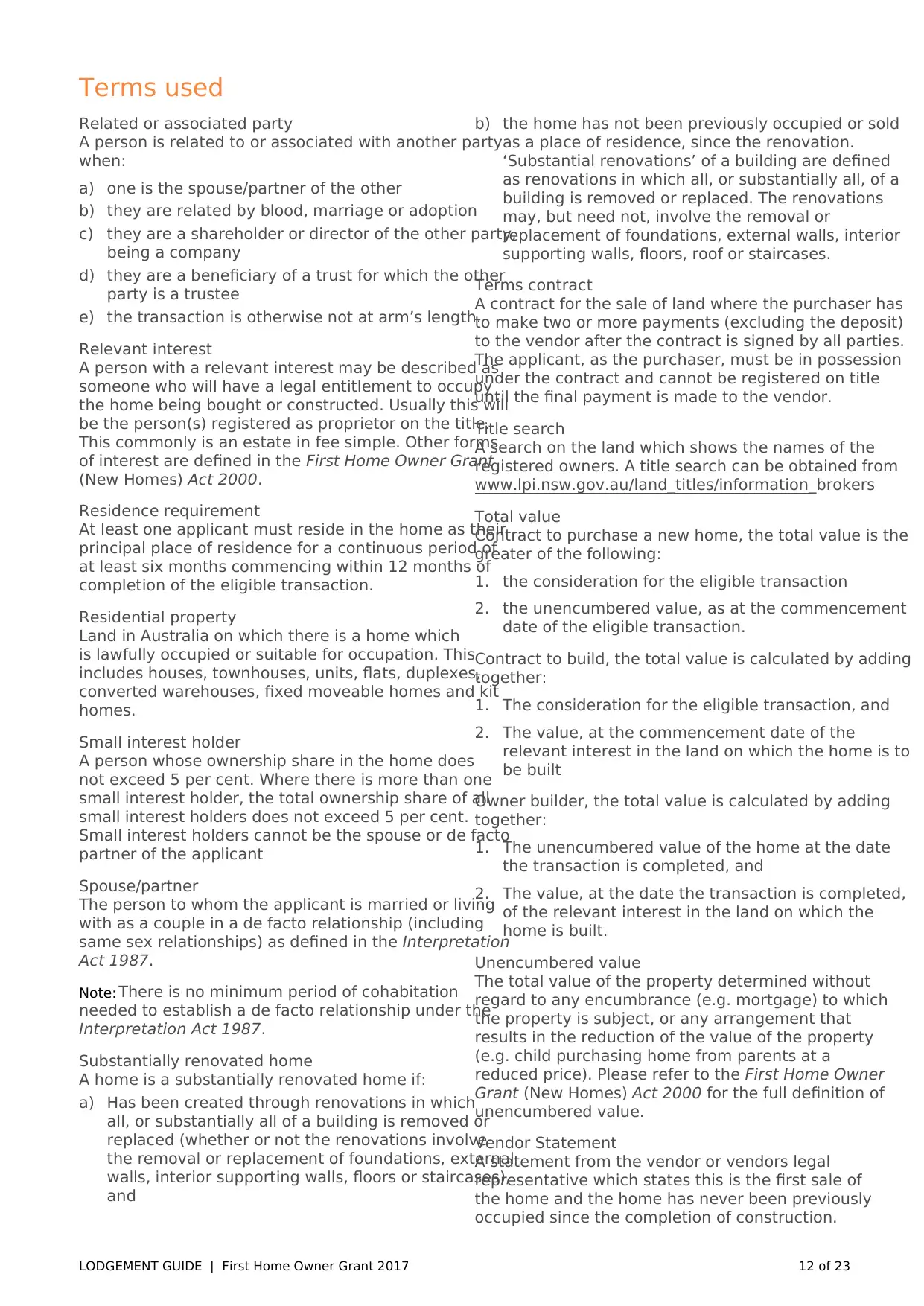
LODGEMENT GUIDE | First Home Owner Grant 2017 12 of 23
Related or associated party
A person is related to or associated with another party
when:
a) one is the spouse/partner of the other
b) they are related by blood, marriage or adoption
c) they are a shareholder or director of the other party,
being a company
d) they are a beneficiary of a trust for which the other
party is a trustee
e) the transaction is otherwise not at arm’s length.
Relevant interest
A person with a relevant interest may be described as
someone who will have a legal entitlement to occupy
the home being bought or constructed. Usually this will
be the person(s) registered as proprietor on the title.
This commonly is an estate in fee simple. Other forms
of interest are defined in the First Home Owner Grant
(New Homes) Act 2000.
Residence requirement
At least one applicant must reside in the home as their
principal place of residence for a continuous period of
at least six months commencing within 12 months of
completion of the eligible transaction.
Residential property
Land in Australia on which there is a home which
is lawfully occupied or suitable for occupation. This
includes houses, townhouses, units, flats, duplexes,
converted warehouses, fixed moveable homes and kit
homes.
Small interest holder
A person whose ownership share in the home does
not exceed 5 per cent. Where there is more than one
small interest holder, the total ownership share of all
small interest holders does not exceed 5 per cent.
Small interest holders cannot be the spouse or de facto
partner of the applicant
Spouse/partner
The person to whom the applicant is married or living
with as a couple in a de facto relationship (including
same sex relationships) as defined in the Interpretation
Act 1987.
Note: There is no minimum period of cohabitation
needed to establish a de facto relationship under the
Interpretation Act 1987.
Substantially renovated home
A home is a substantially renovated home if:
a) Has been created through renovations in which
all, or substantially all of a building is removed or
replaced (whether or not the renovations involve
the removal or replacement of foundations, external
walls, interior supporting walls, floors or staircases),
and
b) the home has not been previously occupied or sold
as a place of residence, since the renovation.
‘Substantial renovations’ of a building are defined
as renovations in which all, or substantially all, of a
building is removed or replaced. The renovations
may, but need not, involve the removal or
replacement of foundations, external walls, interior
supporting walls, floors, roof or staircases.
Terms contract
A contract for the sale of land where the purchaser has
to make two or more payments (excluding the deposit)
to the vendor after the contract is signed by all parties.
The applicant, as the purchaser, must be in possession
under the contract and cannot be registered on title
until the final payment is made to the vendor.
Title search
A search on the land which shows the names of the
registered owners. A title search can be obtained from
www.lpi.nsw.gov.au/land_titles/information_brokers
Total value
Contract to purchase a new home, the total value is the
greater of the following:
1. the consideration for the eligible transaction
2. the unencumbered value, as at the commencement
date of the eligible transaction.
Contract to build, the total value is calculated by adding
together:
1. The consideration for the eligible transaction, and
2. The value, at the commencement date of the
relevant interest in the land on which the home is to
be built
Owner builder, the total value is calculated by adding
together:
1. The unencumbered value of the home at the date
the transaction is completed, and
2. The value, at the date the transaction is completed,
of the relevant interest in the land on which the
home is built.
Unencumbered value
The total value of the property determined without
regard to any encumbrance (e.g. mortgage) to which
the property is subject, or any arrangement that
results in the reduction of the value of the property
(e.g. child purchasing home from parents at a
reduced price). Please refer to the First Home Owner
Grant (New Homes) Act 2000 for the full definition of
unencumbered value.
Vendor Statement
A statement from the vendor or vendors legal
representative which states this is the first sale of
the home and the home has never been previously
occupied since the completion of construction.
Terms used
Related or associated party
A person is related to or associated with another party
when:
a) one is the spouse/partner of the other
b) they are related by blood, marriage or adoption
c) they are a shareholder or director of the other party,
being a company
d) they are a beneficiary of a trust for which the other
party is a trustee
e) the transaction is otherwise not at arm’s length.
Relevant interest
A person with a relevant interest may be described as
someone who will have a legal entitlement to occupy
the home being bought or constructed. Usually this will
be the person(s) registered as proprietor on the title.
This commonly is an estate in fee simple. Other forms
of interest are defined in the First Home Owner Grant
(New Homes) Act 2000.
Residence requirement
At least one applicant must reside in the home as their
principal place of residence for a continuous period of
at least six months commencing within 12 months of
completion of the eligible transaction.
Residential property
Land in Australia on which there is a home which
is lawfully occupied or suitable for occupation. This
includes houses, townhouses, units, flats, duplexes,
converted warehouses, fixed moveable homes and kit
homes.
Small interest holder
A person whose ownership share in the home does
not exceed 5 per cent. Where there is more than one
small interest holder, the total ownership share of all
small interest holders does not exceed 5 per cent.
Small interest holders cannot be the spouse or de facto
partner of the applicant
Spouse/partner
The person to whom the applicant is married or living
with as a couple in a de facto relationship (including
same sex relationships) as defined in the Interpretation
Act 1987.
Note: There is no minimum period of cohabitation
needed to establish a de facto relationship under the
Interpretation Act 1987.
Substantially renovated home
A home is a substantially renovated home if:
a) Has been created through renovations in which
all, or substantially all of a building is removed or
replaced (whether or not the renovations involve
the removal or replacement of foundations, external
walls, interior supporting walls, floors or staircases),
and
b) the home has not been previously occupied or sold
as a place of residence, since the renovation.
‘Substantial renovations’ of a building are defined
as renovations in which all, or substantially all, of a
building is removed or replaced. The renovations
may, but need not, involve the removal or
replacement of foundations, external walls, interior
supporting walls, floors, roof or staircases.
Terms contract
A contract for the sale of land where the purchaser has
to make two or more payments (excluding the deposit)
to the vendor after the contract is signed by all parties.
The applicant, as the purchaser, must be in possession
under the contract and cannot be registered on title
until the final payment is made to the vendor.
Title search
A search on the land which shows the names of the
registered owners. A title search can be obtained from
www.lpi.nsw.gov.au/land_titles/information_brokers
Total value
Contract to purchase a new home, the total value is the
greater of the following:
1. the consideration for the eligible transaction
2. the unencumbered value, as at the commencement
date of the eligible transaction.
Contract to build, the total value is calculated by adding
together:
1. The consideration for the eligible transaction, and
2. The value, at the commencement date of the
relevant interest in the land on which the home is to
be built
Owner builder, the total value is calculated by adding
together:
1. The unencumbered value of the home at the date
the transaction is completed, and
2. The value, at the date the transaction is completed,
of the relevant interest in the land on which the
home is built.
Unencumbered value
The total value of the property determined without
regard to any encumbrance (e.g. mortgage) to which
the property is subject, or any arrangement that
results in the reduction of the value of the property
(e.g. child purchasing home from parents at a
reduced price). Please refer to the First Home Owner
Grant (New Homes) Act 2000 for the full definition of
unencumbered value.
Vendor Statement
A statement from the vendor or vendors legal
representative which states this is the first sale of
the home and the home has never been previously
occupied since the completion of construction.
Terms used
⊘ This is a preview!⊘
Do you want full access?
Subscribe today to unlock all pages.

Trusted by 1+ million students worldwide
1 out of 23
Related Documents
Your All-in-One AI-Powered Toolkit for Academic Success.
+13062052269
info@desklib.com
Available 24*7 on WhatsApp / Email
![[object Object]](/_next/static/media/star-bottom.7253800d.svg)
Unlock your academic potential
Copyright © 2020–2026 A2Z Services. All Rights Reserved. Developed and managed by ZUCOL.





